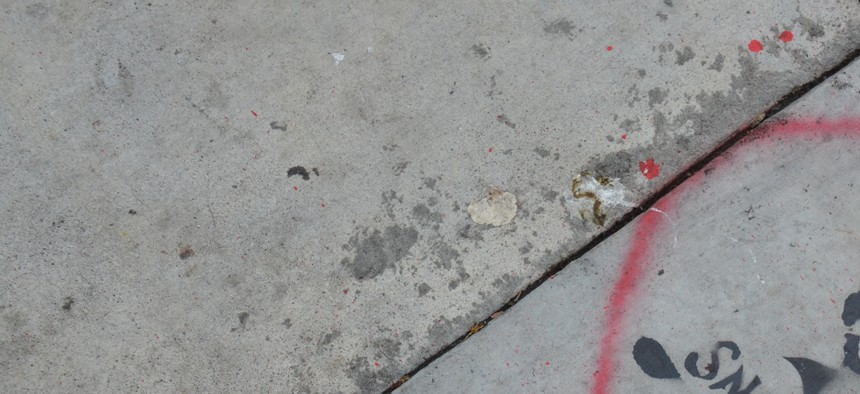
Flickr user Steve Rhodes
Edward Snowden Is Worried People Will Forget About Edward Snowden
The standard-bearer for spy-agency reform fears NSA fatigue is leading to a culture of complacency.
At the bottom of an expansive profile of him in Wired magazine published online Wednesday, Edward Snowden disclosed one of his biggest fears.
What if, gradually, people are growing accustomed to mass government surveillance?
The fugitive leaker, who more than a year ago aired the National Security Agency's dirty surveillance laundry to a couple of hand-picked journalists, is worried that public agitation about the sweeping scope of bulk data collection is waning with time—and with it, the desire to reform the government's spy agencies.
As journalist James Bamford, who spent three days in Moscow with the 31-year-old computer technician, writes:
Another concern for Snowden is what he calls NSA fatigue—the public becoming numb to disclosures of mass surveillance, just as it becomes inured to news of battle deaths during a war. "One death is a tragedy, and a million is a statistic," he says, mordantly quoting Stalin. "Just as the violation of Angela Merkel's rights is a massive scandal and the violation of 80 million Germans is a nonstory." Nor is he optimistic that the next election will bring any meaningful reform.
Is the pressure for NSA reform easing? It has been 14 months since Snowden met with journalists Glenn Greenwald and Laura Poitras in Hong Kong to hand over a treasure trove of classified documents he downloaded while working for Booz Allen Hamilton in Hawaii. And despite pledges from President Obama last January that the NSA would undergo changes and regain the public's trust—if Congress sent him an appropriate reform package—no such bills have since been signed into law.
Shortly after an initial wave of negative backlash that greeted Snowden when his leaks first surfaced in June 2013, the public began clamoring for reform, as a clearer portrait of the NSA's bulk collection of domestic phone metadata—the time stamps, location, and numbers associated with a call but not its actual contents—began to emerge. As a result, the House nearly defunded the NSA's surveillance programs in July 2013, when an amendment backed by Reps. Justin Amash and John Conyers fell just 12 votes short of passing.
That sudden rebuke of the intelligence agencies was seen at the time as a foreboding omen of what was ahead, but it wasn't until May of this year that the House passed a watered-down version of the USA Freedom Act, which tech companies and privacy advocates derided as an insufficient and loophole-laden answer to NSA spying.
But last month, Senate Judiciary Committee Chairman Patrick Leahy introduced a beefed-up version of the Freedom Act, which has been received warmly by most NSA critics and endorsed by the White House. The measure would bar the NSA from collecting American phone records in bulk and instead require phone companies to store the data, which the government can request on an as-needed basis. It specifies that the NSA can't gather all data from broad "targets" such as a particular service provider or zip code, and creates a panel of special advocates to support privacy rights before the Foreign Intelligence Surveillance Court, among other reforms.
Despite the bill's backing, it still faces hurdles from defense hawks like Senate Intelligence Committee Chairwoman Dianne Feinstein and privacy zealots like Sen. Ron Wyden, who argue that it still doesn't go far enough. It remains unclear whether the Senate will find time after its August recess to get to surveillance reform in its short, election-year calendar.
Meanwhile, Snowden and his confidants are working to keep government surveillance in the news and to prevent "NSA fatigue." As Greenwald and others continue to publish a steady drip of revelations about the NSA and other spy agencies, Snowden is cashing in on his notoriety with additional publicity.
The fugitive remains elusive to U.S. authorities, who want him to come home to face espionage charges. But if 2013 saw Snowden dashing around the globe in search of refuge from U.S. authorities, 2014 has been a year of steadily increasing willingness to draw attention, either by speaking at events via Skype or Google Hangouts or granting access to journalists.
In the past few months, NBC's Brian Williams, The Guardian, and now Wired have sat down for extensive interviews with Snowden. Each interview has attracted broad interest and discussion, but not just because Snowden is an internationally known fugitive. In all of them, Snowden hasdropped new details about the NSA surveillance practices or his time working as a contractor with Booz Allen, adding fresh ingredients to a debate that is now more than a year old.
Meanwhile, as Snowden attempts to remain relevant—Wired's cover photo finds hims draped in an American flag, which is infuriating some of his detractors—he hedges his bets by continuing to argue that technology, and not politics, may be the best avenue to surveillance reform.
"We have the means and we have the technology to end mass surveillance without any legislative action at all, without any policy changes," Snowden told Wired. "By basically adopting changes like making encryption a universal standard—where all communications are encrypted by default—we can end mass surveillance not just in the United States but around the world."
(Image via Flickr user Steve Rhodes)







